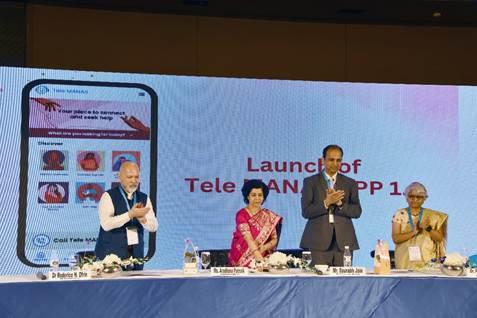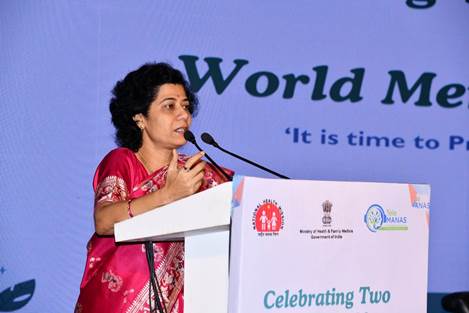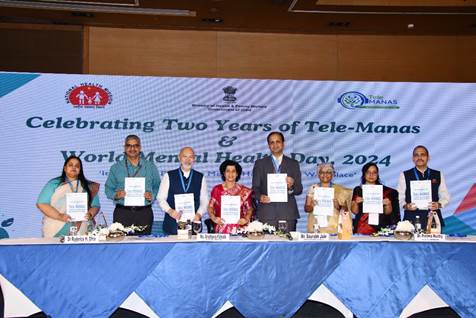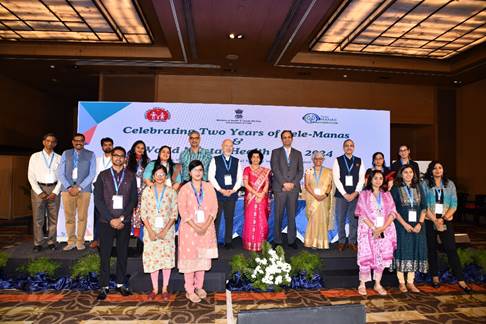The Union Health Ministry celebrated the completion of two years of National Tele Mental Health Programme, Tele Mental Health Assistance and Networking across States (Tele MANAS) on World Mental Health Day, here today. The theme of this year’s World Mental Health Day is: “It is time to prioritize Mental Health at Workplace”.
Smt. Aradhana Patnaik, Additional Secretary, MoHFW & Managing Director, National Health Mission (NHM) launched the Tele MANAS app and Tele MANAS video call facility in the presence of Dr. Roderico H. Ofrin, World Health Organization (WHO) Representative to India, Shri Saurabh Jain, Joint Secretary, MoHFW, Dr. Partima Murthy, Director, National Institute of Mental Health and Neuro Sciences (NIMHANS) and other senior officers from the Ministry.
Tele MANAS app is a comprehensive mobile platform that has been developed for providing support for mental health issues. The app has a library of information including tips on self-care, recognizing distress signals, managing early signs of stress, anxiety, and emotional struggles. It facilitates engagement of the user through mind challenges, games and mindfulness practices providing a user-friendly experience. The app will help users connect for free and get confidential mental health support through trained mental health professionals across India, 24×7 for immediate counseling.
Video consultations in Tele MANAS is another upgrade to the already existing audio calling facility. This will be undertaken by the mental health professionals who are taking audio call escalations to get further information about the caller as part of history taking and clarification. This can also enable a brief physical examination or a Mental State Examination (MSE) for the caller to confirm any findings. This facility will be initially launched in the states of Karnataka, Jammu & Kashmir and Tamil Nadu and later scaled up to the whole country.

In her inaugural address, Smt. Aradhana Patnaik stated that “Mental health is fundamental to health and plays a crucial role in enabling individuals, families and communities to function at their highest level, work productively and contribute to society. Unhealthy work environments and other unfavorable working conditions have an impact on one’s general health, well-being, mental health, and involvement or productivity at work. There is a need for creating a good work environment and work-life balance for more productive results in the workplace.”

She stated that “Tele MANAS has reached a significant milestone, having handled over 14.5 lakh calls since its launch.”
Underlining the importance of adolescent mental health and issues faced by the adolescent population, Smt. Patnaik stressed “the need for Information, Education, and Communication (IEC) to ensure awareness about the Tele MANAS App”.
Talking about mental health in the workplace, Dr. Roderico H. Ofrin, WHO Representative to India, stated that issues like gender inequity, disrespectful unsupportive colleagues, lack of work-life balance, and job satisfaction lead to mental health challenges for the employees in the workplace. He emphasized the responsibility of employers and managers to create a supportive work environment.
Congratulating the Ministry for two years with the successful implementation of Tele-MANAS, he stated that “WHO review of Tele-MANAS has shown a successful model for mental health. It has the potential to work well. The primary healthcare especially the Ayushmann Arogya Mandirs have proven to be successful in improving mental health and well-being of the people”. He also highlighted the importance of collective efforts of all stakeholders to enhance mental health at the workplace.
Tele MANAS reflects the government’s commitment to nurturing the nation’s mental well-being. The Tele MANAS toll-free helpline numbers 14416 or 1-800-891-4416 offer multi-language support in 20 languages and have been pivotal in facilitating communication between callers and mental health professionals.
The Report of Tele MANAS rapid assessment by World Health Organizations (WHO) and a Selfcare Module for Employees titled ‘Taking charge of your mental health- because it matters” was also released at the event.

In order to evaluate the performance and progress of Tele MANAS, a rapid assessment was organized by MoHFW in coordination with WHO India, World Health Organization (WHO) Regional Office for South-East Asia (WHO SEARO), WHO Headquarters & NIMHANS. The assessment was based on desk reviews of national data and primary data collected from four states/Union Territories- Jammu and Kashmir, Karnataka, Madhya Pradesh, and Odisha. The report appreciates the novel initiative of the Government of India and highlights some significant milestones achieved by Tele MANAS in providing mental health support and its robust technological architecture.
The booklet ‘Taking Charge of Your Mental Health- Because It Matters” focuses on the efforts that individuals could make to maintain mental health and well-being. The booklet attempts to clear some of the misconceptions regarding mental health and offers a few strategies that individuals could try to explore by themselves. It also specifically focuses on stress arising out of difficult workplace situations.

The event further had roundtable discussions with a variety of panelists coming from a diversified group of people that include Ministry of Health & Family Welfare, Ministry of Ayush, Ministry of Labour and Employment, Institutions such as National Institute of Mental Health and Neuro Sciences (NIMHANS), All India Institute of Medical Sciences (AIIMS) New Delhi, Institute of Human Behaviour and Allied Sciences (IHBAS), WHO, Industry associations such as Federation of Indian Chambers of Commerce & Industry (FICCI)/ Confederation of Indian Industry (CII) and NAT Health (Healthcare Federation of India), Development partners such as Program for Appropriate Technology in Health (PATH), organizations promoting wellness such as Art of Living Foundation and Arogya World, and Civil society organization like Jan Sahas.
The topics discussed during the sessions included policies and frameworks to foster mental health resilience at workplaces; Mental Wellbeing at Informal Workplaces / Challenges, Opportunities, and Inclusive Solutions; and Preventive Mental Health- The Role of Holistic Practices in Promoting Well-being. The panelists also explored the role of Ayushman Arogya Mandirs (AAMs) & Tele MANAS in promoting mental health support. Furthermore, Union Health Ministry has sought active participation from other Ministries of the Government to implement employee engagement activities designed to support mental health in the workplace.

Comments are closed.